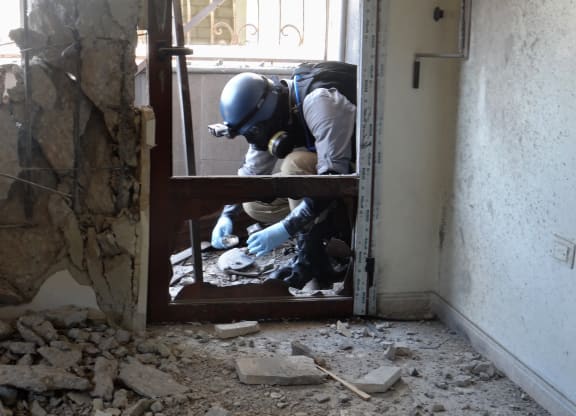A report to the United Nations has confirmed chemical weapons were used in Syria in an attack near Damascus in August this year in which hundreds of civilians were killed.
UN experts who handed over their final report to UN Secretary-General Ban Ki-moon said that chemical weapons were probably also used in four other attacks investigated.

A UN arms expert collects samples in August at a site in Ghouta in Damascus after a suspected chemical weapons strike near the capital. Photo: AFP
The report does not say whether the government or rebels used the weapons. That lack of clarity about who was responsible makes the report frustrating, but the inspectors were only mandated to find out if chemical weapons were used, rather than to assign blame, the BBC reports.
But in many ways the investigation has already been overtaken by the diplomacy. After denying the existence of its chemical weapons stockpiles, Bashar al-Assad's regime agreed to their dismantlement.
The report says there is "credible evidence" and "evidence consistent with the probable use of chemical weapons" in the Syrian districts of Ghouta, Khan Al Asal, Jobar, Saraqueb and Ashrafieh Sahnaya, AFP reports.
But the UN inspectors said they could not corroborate their use in two more of the seven sites studied: Bahhariyeh and Sheik Maqsood.
The most dangerous chemical substances are to be transported out of Syria by the end of this year.
'Paltry' amount of refugees resettled in Europe
Amnesty International says European leaders should be ashamed by the paltry numbers of refugees from Syria they are prepared to resettle, the BBC reports.
The human rights group complains that only 10 member states have offered to take in refugees totalling only 12,000, while the United Kingdom and Italy have not offered any places.
The UN estimates that almost 2.3 million Syrians have fled to neighbouring countries since March 2011. Most are in Lebanon, Jordan and Turkey, with others in Iraq and Egypt.
About 6000 this year have reached European Union member state Bulgaria, which has appealed for financial help from Brussels.

